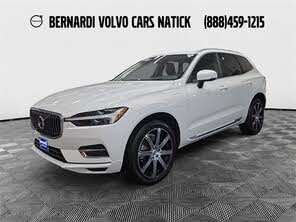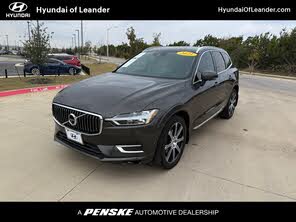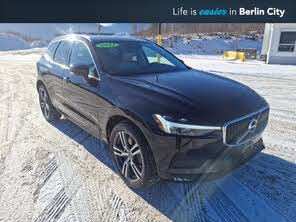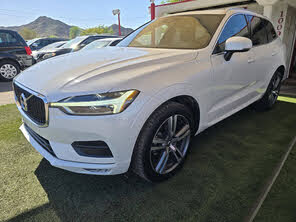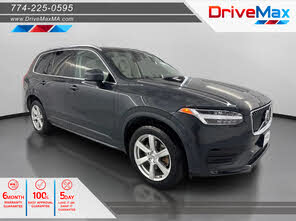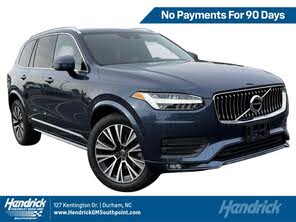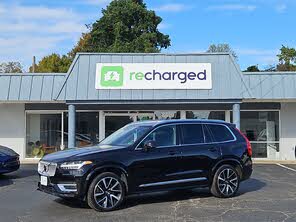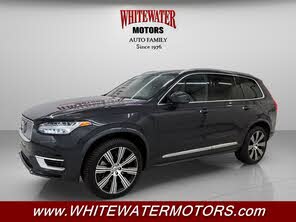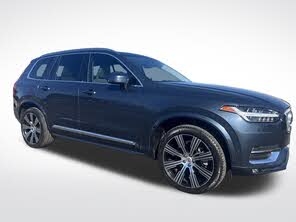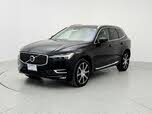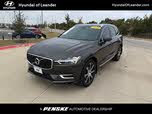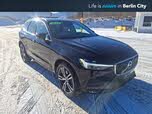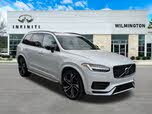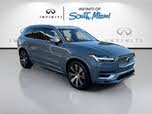2021 Volvo XC60 vs 2021 Volvo XC90
Overview | |
MSRP$41,700 | MSRP$49,000 |
Listings284 | Listings316 |
Ratings & Reviews | |
User Reviews | User Reviews |
Expert reviews8.0 out of 10 | Expert reviews7.7 out of 10 |
Pros
Cons
| Pros
Cons
|
2021 Volvo XC60 Reviews SummaryIn the middle of a very competent trio of crossover SUVs, the 2021 Volvo XC60 impresses with luxury-level appointments, cool Scandinavian style, exceptional safety features, and a lusty powertrain. Volvo makes a case for its inclusion in the premium vehicle class with the XC60, and it manages to squeeze value out of every drop of gas, too. | |
2021 Volvo XC90 Reviews SummaryVolvo may be known for sensible station wagons, but the XC90 SUV is the Swedish automaker’s de facto flagship. The current generation debuted design features, technology, and powertrains that have since found their way into most other Volvo models. Several years into the current-generation model’s lifecycle, the XC90 is no longer a trendsetter, but remains Volvo’s contender in the competitive midsize luxury SUV segment, with the automaker’s typical emphasis on safety features. The current-generation XC90 launched for the 2016 model year, so most competitors—including the Audi Q7, Acura MDX, BMW X5, and Mercedes-Benz GLE-Class—have been updated or redesigned since then. The Cadillac XT6 and Lincoln Aviator didn’t even exist when this generation of XC90 launched. A redesigned version is expected to arrive soon, so changes to the 2021 XC90 are minimal. All 2021 Volvo models are now limited to 112 mph for safety reasons and get Care Key, which lets owners limit the top speed before loaning the car out to a friend or family member. The XC90 also gets a handful of newly standard tech features, and some small cosmetic changes. Volvo offers the XC90 in three trim levels—Momentum, R-Design, and Inscription—with three powertrain options: T5 and T6 gasoline engines, and the T8 plug-in hybrid. Our test car was a range-topping T8 Recharge Inscription, combining the top Inscription trim level with the plug-in hybrid powertrain, which has the highest output of the three. | |
No video found | No video found |
Popular Features & Specs | |
Engine2.0L 250 hp I4 | Engine2.0L 250 hp I4 |
Drive TrainFWD | Drive TrainFWD |
Seating Capacity5 | Seating Capacity7 |
Horsepower250 hp @ 5500 rpm | Horsepower250 hp @ 5500 rpm |
MPG City22 | MPG City21 |
MPG Highway29 | MPG Highway30 |
Engine | |
Engine Name2.0L 250 hp I4 | Engine Name2.0L 250 hp I4 |
Torque258 lb-ft @ 1500 rpm | Torque258 lb-ft @ 1500 rpm |
Horsepower250 hp @ 5500 rpm | Horsepower250 hp @ 5500 rpm |
DrivetrainFWD | DrivetrainFWD |
Fuel Economy | |
MPG City22 | MPG City21 |
MPG Highway29 | MPG Highway30 |
Interior | |
Leather SeatsStandard | Leather Seats |
Seating Capacity5 | Seating Capacity7 |
Key Features | |
Sunroof/MoonroofStandard | Sunroof/MoonroofStandard |
Safety | |
Front Crash Overall5 | Front Crash Overall5 |
Side Crash Overall5 | Side Crash Overall5 |
Dimensions & Capacity | |
Cargo Space37.8 cu ft | Cargo Space10.7 cu ft |
Curb Weight4008 lbs | Curb Weight4374 lbs |
Height65.3 in | Height69.9 in |
Length184.6 in | Length195.0 in |
Width83.3 in | Width84.3 in |
Wheelbase112.8 in | Wheelbase117.5 in |
Maximum Payload950 lbs | Maximum Payload1631 lbs |
Number of doors4 | Number of doors4 |
Maximum Towing Capacity3500 lbs | Maximum Towing Capacity4000 lbs |
Overview | ||
MSRP | $41,700 | $49,000 |
Listings | ||
Ratings & Reviews | ||
User reviews | ||
Expert reviews | 8.0 out of 10Read full review | 7.7 out of 10Read full review |
Pros & cons | Pros
Cons
| Pros
Cons
|
Summary | In the middle of a very competent trio of crossover SUVs, the 2021 Volvo XC60 impresses with luxury-level appointments, cool Scandinavian style, exceptional safety features, and a lusty powertrain. Volvo makes a case for its inclusion in the premium vehicle class with the XC60, and it manages to squeeze value out of every drop of gas, too. | Volvo may be known for sensible station wagons, but the XC90 SUV is the Swedish automaker’s de facto flagship. The current generation debuted design features, technology, and powertrains that have since found their way into most other Volvo models. Several years into the current-generation model’s lifecycle, the XC90 is no longer a trendsetter, but remains Volvo’s contender in the competitive midsize luxury SUV segment, with the automaker’s typical emphasis on safety features. The current-generation XC90 launched for the 2016 model year, so most competitors—including the Audi Q7, Acura MDX, BMW X5, and Mercedes-Benz GLE-Class—have been updated or redesigned since then. The Cadillac XT6 and Lincoln Aviator didn’t even exist when this generation of XC90 launched. A redesigned version is expected to arrive soon, so changes to the 2021 XC90 are minimal. All 2021 Volvo models are now limited to 112 mph for safety reasons and get Care Key, which lets owners limit the top speed before loaning the car out to a friend or family member. The XC90 also gets a handful of newly standard tech features, and some small cosmetic changes. Volvo offers the XC90 in three trim levels—Momentum, R-Design, and Inscription—with three powertrain options: T5 and T6 gasoline engines, and the T8 plug-in hybrid. Our test car was a range-topping T8 Recharge Inscription, combining the top Inscription trim level with the plug-in hybrid powertrain, which has the highest output of the three. |
Video | No video found | No video found |
Popular Features & Specs | ||
Engine | 2.0L 250 hp I4 | 2.0L 250 hp I4 |
Drive Train | FWD | FWD |
Seating Capacity | 5 | 7 |
Horsepower | 250 hp @ 5500 rpm | 250 hp @ 5500 rpm |
MPG City | 22 | 21 |
MPG Highway | 29 | 30 |
Engine | ||
Engine Name | 2.0L 250 hp I4 | 2.0L 250 hp I4 |
Torque | 258 lb-ft @ 1500 rpm | 258 lb-ft @ 1500 rpm |
Horsepower | 250 hp @ 5500 rpm | 250 hp @ 5500 rpm |
Drivetrain | FWD | FWD |
Fuel Economy | ||
MPG City | 22 | 21 |
MPG Highway | 29 | 30 |
Interior | ||
Leather Seats | Standard | |
Seating Capacity | 5 | 7 |
Key Features | ||
Sunroof/Moonroof | Standard | Standard |
Safety | ||
Front Crash Overall | 5 | 5 |
Side Crash Overall | 5 | 5 |
Dimensions & Capacity | ||
Cargo Space | 37.8 cu ft | 10.7 cu ft |
Curb Weight | 4008 lbs | 4374 lbs |
Height | 65.3 in | 69.9 in |
Length | 184.6 in | 195.0 in |
Width | 83.3 in | 84.3 in |
Wheelbase | 112.8 in | 117.5 in |
Maximum Payload | 950 lbs | 1631 lbs |
Number of doors | 4 | 4 |
Maximum Towing Capacity | 3500 lbs | 4000 lbs |
Volvo has long been known for its conservative styling, but significant updates in recent years have breathed new life into its models. The 2021 Volvo XC60 and 2021 Volvo XC90 both reflect a sophisticated blend of old-world charm and modern elegance.
The 2021 Volvo XC60, built on Volvo's Scalable Product Architecture (SPA) platform, exhibited a sleek design with short front and rear overhangs, making it appear athletic and agile. The body sides were smartly tucked in while crisp detailing added a touch of refinement. Its upright grille proudly bore the Volvo Iron Mark logo, and it featured distinctive LED headlights shaped like Thor's hammer, merging modernity with cultural lore. The paint quality, chrome finish, and overall trim were top-notch, with alloy wheels that could be as large as 21 inches accentuating its fashionable look.
Inside, the XC60 continued to impress with its Scandinavian minimalist interior. Its clean lines, authentic materials, and serene cabin atmosphere felt inviting and high-end. The 9-inch portrait-oriented infotainment touchscreen was easier to use by 2021, compared to its controversial introduction in 2018. Small details like the elegantly designed HVAC vents with a single grooved, chromed knob added to its near-luxury experience, making the XC60 a pleasant place to spend time.
In contrast, the 2021 Volvo XC90 added a bit more character to its inherently Volvo design while maintaining a boxy profile and a blunt front end. Enhancements such as moderately softer lines, extra chrome, and LED Thor’s hammer lights offered a blend of familiarity and novelty. The Inscription trim level, with its extra chrome and optional 21-inch alloy wheels, was particularly flashy. The mid-level R-Design and base model Momentum sported a slightly different aesthetic, with the latter lacking some of the extra detailing.
The XC90's interior echoed Swedish minimalism, with an environment that was functional yet luxurious. The matte-finish wood trim looked natural and less ostentatious than the heavily lacquered trims in other luxury SUVs. The options for wool or Nappa leather upholstery, combined with high-end touches like an Orrefors crystal shifter, gave the interior a unique flair, even if some of these elements felt slightly out of place in the otherwise restrained ambiance.


















Under the hood, both the XC60 and XC90 featured a variety of powertrains based on a 2.0-liter four-cylinder engine mated to an eight-speed automatic transmission, but their respective performance metrics showcased slightly different capabilities.
The 2021 Volvo XC60 offered three main powertrains: the T5, T6, and T8. The T5 used direct gasoline injection and a turbocharger to generate 250 horsepower and 258 lb-ft of torque, available in both FWD and AWD. The T6 model took it up a notch with both a turbocharger and a supercharger, producing 316 hp and 295 lb-ft of torque, available in AWD only. Going further, the T8 combined the T6 engine with an 87-hp electric motor, achieving a total of 400 hp and 472 lb-ft of torque. The top-of-the-line T8 Polestar Engineered variant tuned this setup to 415 hp. All T8 models were plug-in hybrids, capable of driving up to 19 miles on electric power alone. The XC60 excelled in handling, feeling solid and secure while maintaining ease of maneuverability, and offered fuel economy ratings ranging from 22/29 mpg (city/highway) for the T5 FWD to 27 mpg combined for the T8 PHEV, with a staggering 57 MPGe for the T8 in electric-only mode.
Similarly, the 2021 XC90 had three main powertrains named the T5, T6, and T8 Recharge. The T5 produced the same 250 hp and 258 lb-ft, with FWD standard and AWD optional. The T6 boosted performance to 316 hp and 295 lb-ft of torque, with AWD as standard. The T8 Recharge, however, combined the T6 setup with additional electric motors for a total of 400 hp and 472 lb-ft of torque, shared in commonality with the XC60. While the 400 hp figure was more than adequate for the XC90’s size, the smaller engine sometimes struggled to deliver seamless power, particularly from a stop. The XC90 offered three driving modes—Pure, Hybrid, and Power—but maximizing all-electric driving was challenging, often requiring the gasoline engine to assist. Despite these limitations in pure performance, the XC90 boasted an excellent ride quality and quiet cabin, augmented by an optional air suspension system. The SUV's 5,000-pound tow rating held strong, albeit inferior to some competitors like the Lincoln Aviator, which could pull up to 6,700 pounds.
The 2021 Volvo XC60 was expertly designed to deliver comfort and practicality. The front row particularly showcased Volvo's renowned seat comfort and adjustability with heated options proving invaluable during harsh Michigan winters. The HVAC system was highly efficient, ensuring clear visibility and swift temperature adjustments. Storage options were plentiful, with smartly designed pockets and bins throughout the cabin. The XC60 offered a decent cargo capacity, boasting 21.6 cubic feet behind the rear seats and up to 63.6 cubic feet with the rear seats folded flat. The vehicle could tow up to 3,500 pounds, making it a versatile choice for small families.
In comparison, the 2021 Volvo XC90 catered more comprehensively to families through its three-row seating arrangement, available in either six-seat or seven-seat configurations depending on whether you chose captain’s chairs or a bench seat for the second row. Headroom and legroom were about average, but third-row space was tight, making them less suitable for adults over long distances. The XC90's interior did feel more spacious, partly due to an extended power moonroof covering the first two rows and the model’s upright profile. The climate control offered four-zone settings with an available filtration system to capture fine particulate matter, enhancing cabin air quality. However, storage up front was somewhat limited, with shallow center console bins. In terms of cargo, the hybrid XC90 T8 Recharge lagged behind with merely 11.2 cubic feet of cargo space with all seats up, 34.1 cubic feet with the rear seats folded, and 64.1 cubic feet with all seats down—a slight, yet noticeable difference compared to the XC60's capacity.
Volvo's Sensus infotainment system dominated the interiors of both the XC60 and XC90, though user experience varied.
In the XC60, the Sensus system centered around a tablet-style interface, which could be polarizing. For tech-savvy users familiar with devices like iPads, the swipe and pinch gestures were intuitive and easy to navigate. The screen’s portrait orientation and function quadrants aimed to simplify interaction, though there was a learning curve. Smartphone integration was comprehensive, with Apple CarPlay, Android Auto, and a WiFi hotspot, alongside the Volvo On Call app features like remote locking and starting. The test model also featured a Bowers & Wilkins premium audio system, which was not just functional but aesthetically pleasing.
The XC90 shared the Sensus infotainment system but emphasized a "less is more" approach. It had the same 9-inch touchscreen, digital instrument cluster, and compatibility with Apple CarPlay and Android Auto. Two USB-A ports in the front and two USB-C ports in the back were standard. A 19-speaker Bowers & Wilkins premium audio system was also available. Despite fewer physical buttons, the touchscreen’s ease of use complemented the minimalist interior well. The only minor hitch was the new wireless charging pad added in 2021, which sometimes struggled to accommodate larger phones, posing a slight inconvenience to users.
Volvo’s commitment to safety is historic and deeply ingrained, a fact well-embodied by both the XC60 and XC90.
The 2021 XC60 was adorned with a multitude of standard safety features, echoing Volvo’s philosophy of harm reduction. These included LED headlights, blind-spot monitoring, rear cross-traffic alert, collision avoidance systems, and a variety of other advanced safety tools. The vehicle also garnered excellent safety ratings: a Top Safety Pick+ from IIHS and five-star ratings from NHTSA (for T5/T5 AWD and T6 AWD models). Features such as Volvo's semi-autonomous Pilot Assist system, capable of integrating adaptive cruise control with lane-keeping assist, contributed to its robust safety profile. The XC60 also boasted a top speed governed to 112 mph for added security, with the T8 Polestar Engineered variant featuring unique gold safety belts—a stylish nod to safety innovation.
The 2021 XC90 similarly achieved top ratings in safety. Though the IIHS’s highest “Top Safety Pick+” rating applied only to non-hybrid models (pending updates on the T8), it still managed to secure excellent results in all crash tests and front-crash prevention tech. NHTSA also awarded five-star overall safety ratings across all XC90 models. The XC90’s extensive list of standard safety features, from lane-keeping assist to a driver attention monitor, further underscored Volvo’s safety-first approach. The Pilot Assist driver aid remained one of the standout systems in the industry, providing smooth functionality and quick responses, although still requiring an attentive human driver to oversee proceedings.
CarGurus highlights
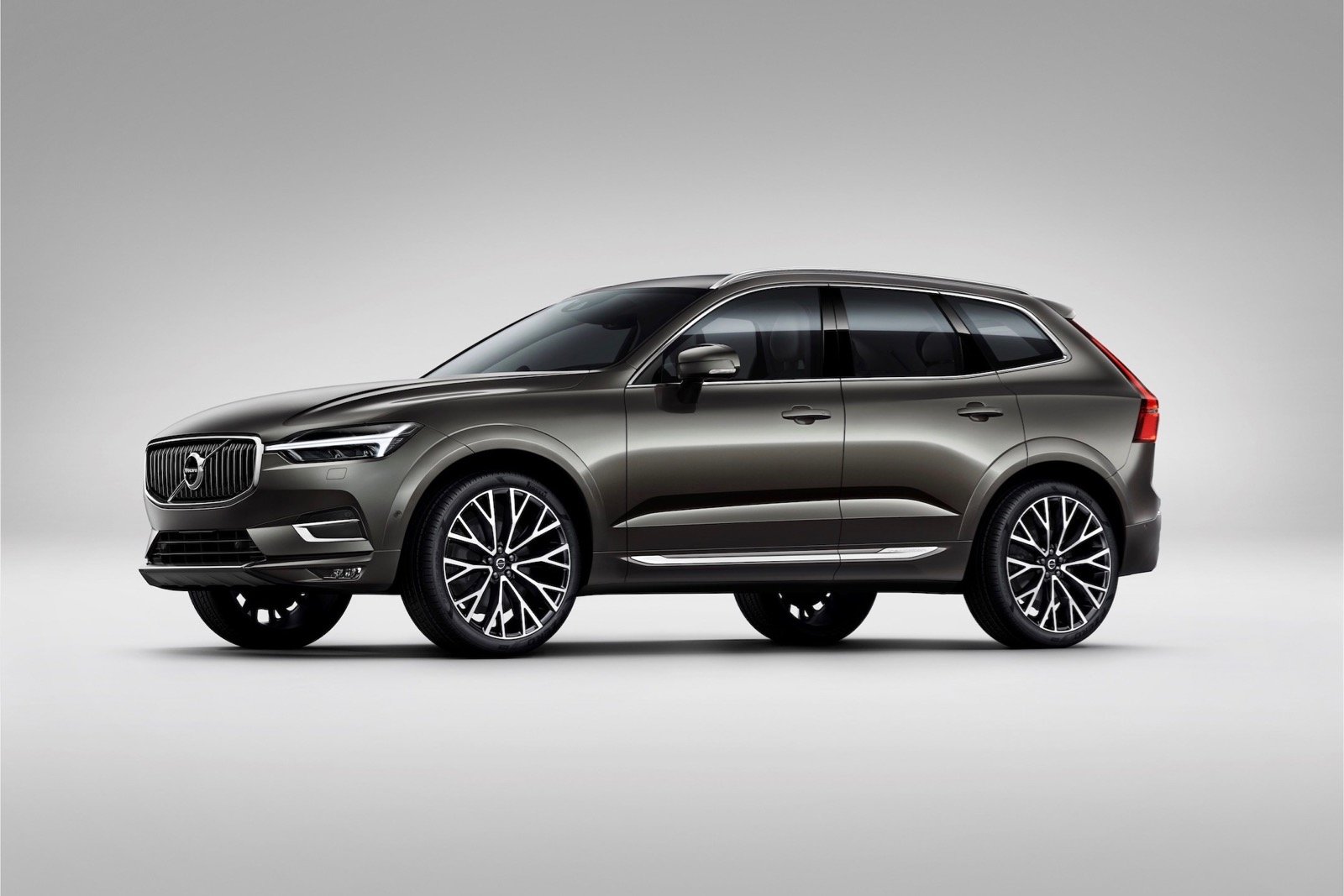
According to CarGurus experts, the overall rating for the 2021 Volvo XC60 is 8.0 out of 10, while the 2021 Volvo XC90 scores 7.7 out of 10. Given the higher rating, the 2021 Volvo XC60 comes recommended for those seeking an optimal blend of performance, luxury, and advanced technology in a compact crossover package. The XC60’s strong safety features, high-tech options, and efficient powertrains make it the smarter choice for a wide range of driving scenarios.
Choose the 2021 Volvo XC60 if:
- You prefer a slightly smaller and more agile crossover that doesn’t skimp on luxury.
- You frequently drive in urban settings and require a vehicle with versatile, yet manageable cargo space.
- You value cutting-edge technology, including plug-in hybrid capabilities, without compromising on fuel efficiency.
Choose the 2021 Volvo XC90 if:
- You need a family vehicle with three rows of seats, offering flexibility for various configurations and more overall space.
- You prioritize advanced safety features combined with luxurious touches and a serene ride quality.
- You require a higher towing capacity for medium to large-sized trailers or boats.
CarGurus highlights

According to CarGurus experts, the overall rating for the 2021 Volvo XC60 is 8.0 out of 10, while the 2021 Volvo XC90 scores 7.7 out of 10. Given the higher rating, the 2021 Volvo XC60 comes recommended for those seeking an optimal blend of performance, luxury, and advanced technology in a compact crossover package. The XC60’s strong safety features, high-tech options, and efficient powertrains make it the smarter choice for a wide range of driving scenarios.
Choose the 2021 Volvo XC60 if:
Shop Now- You prefer a slightly smaller and more agile crossover that doesn’t skimp on luxury.
- You frequently drive in urban settings and require a vehicle with versatile, yet manageable cargo space.
- You value cutting-edge technology, including plug-in hybrid capabilities, without compromising on fuel efficiency.
Choose the 2021 Volvo XC90 if:
Shop Now- You need a family vehicle with three rows of seats, offering flexibility for various configurations and more overall space.
- You prioritize advanced safety features combined with luxurious touches and a serene ride quality.
- You require a higher towing capacity for medium to large-sized trailers or boats.

By: CarGurus + AI
At CarGurus, our team of experienced automotive writers remain at the heart of our content operation, conducting hands-on car tests and writing insightful guides that are backed by years of industry experience. To complement this, we are harnessing AI to make our content offering more diverse and more helpful to shoppers than ever. To achieve this, our AI systems are based exclusively on CarGurus content, ratings and data, so that what we produce is both unique to CarGurus, and uniquely helpful to car shoppers.

